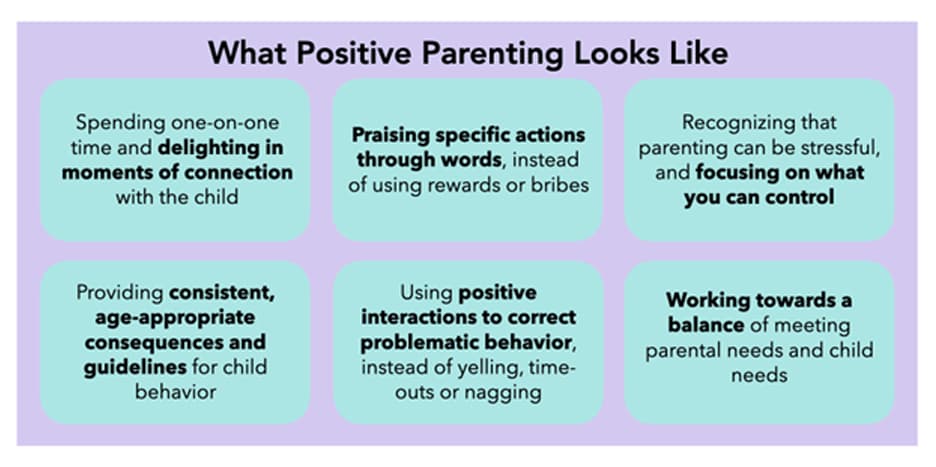These days, there’s no shortage of parenting styles. But after working with thousands of families for more than 20 years, I’ve found positive parenting to be one of the most effective — and my personal favorite.
Unlike authoritarian parenting, which places high expectations on children with little responsiveness, or uninvolved parenting, where there is little nurturance or guidance, positive parenting is an empathy-based approach that involves techniques such as encouragement and problem-solving — rather than shouting, hostility, shaming or leveraging rewards.
In fact, studies have found that when parents resort to constant yelling or nagging, they typically end up feeling frustrated, angry and then guilty afterward. The kids, in turn, may feel frustrated and angry, too, and continue to misbehave.
In the end, very little changes, and the cycle is likely to repeat.
What is positive parenting?
Parents who practice positive parenting don’t use harsh punishment to correct problematic behavior. Instead, they proactively fulfill their kids’ emotional needs through positive interactions, which can prevent a great deal of bad behavior from happening in the first place.

Key traits of positive parenting
Amy McCready | CNBC Make It
According to Caley Arzamarski, a proponent of positive parenting and psychologist specializing in child therapy, positive parenting essentially encourages parents to “catch kids being good” and give more positive feedback, instead of always focusing on bad behavior.
Some parents worry that positive parenting is too fluffy, arguing that children won’t learn to interpret and react to negative emotions if parents don’t help them to see it, which may not serve them well later in life.
However, psychologists have found that positive parenting can promote children’s confidence and provide them with the tools needed to make good choices. It also nurtures their self-esteem, creativity, belief in the future and ability to get along with others.
As parents, we will make mistakes and lose our cool. That presents an ideal opportunity to apologize to our kids and model how we can recover when we mess up.
Here are five ways to practice positive parenting:
1. Spend one-on-one time together
Spending regular quality time with your kids and modeling good behavior is by far the best thing you can do to help them develop self-confidence and healthy relationships.
Kids are hardwired to need positive attention and emotional connection. When they don’t receive it, they seek it out in negative ways, and parents are faced with power struggles, whining and meltdowns.
It only takes 10 to 15 minutes of individual time a day to see improvements. Delighting in moments of connection will also help you create a deeper and more meaningful relationship.
2. Set ‘when-then’ rules
Setting clear expectations is a core aspect of positive parenting. I recommend using the “when-then” method to encourage better behavior during the most challenging times of your child’s day.
Explain to your kid that when the yucky part of a dreaded task is done, then the more enjoyable things can happen. For example, they can use their iPad or play outside after their morning routine is complete — brushing their teeth, getting dressed, eating breakfast — if there’s enough time before the bus arrives.
Stick to this practice, and your kids will quickly learn to move through the routine on their own. No nagging required.
3. Say no to rewards
Studies have found that kids who are rewarded often are likely to lose interest in the activity they’re being rewarded for, whether it’s music practice or playing nicely with a sibling. They become more interested in the rewards, meaning you may have to keep up the rewards to maintain the same quality of behavior.
Using encouragement is a better way to bring out the best in your kids. But avoid phrases that point to their character or personality, such as “You’re the best player on the team!” or “You’re so smart!”





